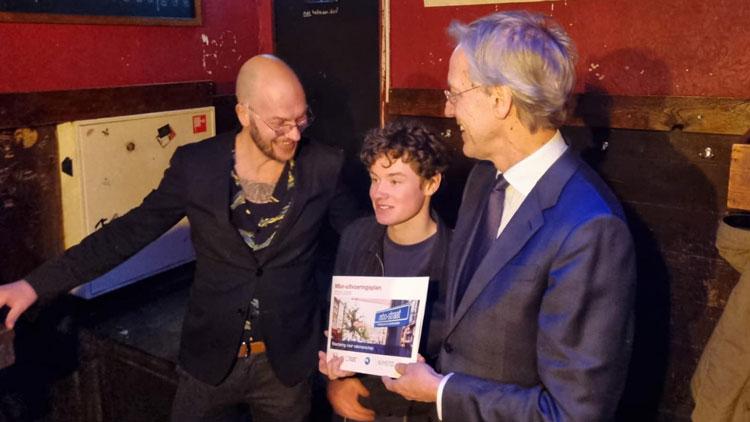To treat MBO equally
City of Utrecht stops using the terms 'higher' and 'lower' educated

The plan was handed over to the Dutch Minister of Education, Robbert Dijkgraaf, last Friday, March 31. The people handing it over were Dennis de Vries, a municipal councilman in Utrecht whose responsibilities include senior secondary vocational education (MBO), and Menno Adelaar, from the MBO student council. The handover took place at the student café de Kneus. The choice of location is not accidental. Last year, the pub landed in hot water after they turned down MBO students at the door (news item in Dutch, Ed.).
This led MBO students to speak out against the discrimination they face in Utrecht’s nightlife, which in turn sparked nationwide discussions about the position of MBO students. The municipality of Utrecht experimented with a number of pilots already in 2022, such as allowing a small number of MBO students to participate in the introduction week (UIT), an event reserved for university students until then. In addition, MBO students now pay the student rate to work out at Olympos sports centre.
Full-fledged education
The municipality’s implementation plan aims to put MBO students in a more equal position and improve the provision of information about the choice of a study programme at the MBO level, among other things. The municipality's official communication will no longer use the term "higher" education to refer to universities and universities of applied sciences (WO and HBO, respectively) and "lower" education to refer to vocational education (MBO). It will simply say WO, HBO and MBO. According to De Vries, something “fundamental needs to change in our society for MBO to be seen as a fully-fledged secondary education, just like HBO and WO.”
The municipality also wants to see structural changes for MBO students in the city's nightlife, study associations and all things related to student life. To achieve that, it is going to work together with UU and the Utrecht University of Applied Sciences as “they play a crucial role in the organisation and supervision of Utrecht’s student life”, the municipality writes in a statement (in Dutch, Ed.).
Traditions
Although there is a plan to make student life more accessible, UU depends on student associations to implement it, so it all depends on how quickly they are willing to adapt. Things can get “complicated”, said UU's Rector Henk Kummeling in a meeting with the University Council. Sports associations, for example, are able to adjust more easily than social associations, which have a long history and many traditions. That's why the rector does not expect the plans to be “realised right away”.
UU is not following the municipality’s policy to quit the terms "lower" and "higher" education, by the way. “According to higher education law, we are still classified as higher education. We cannot deny the reality of the law,” stated Kummeling. “It is more important to highlight the intrinsic value of the different types of education and emphasise that they are all extremely necessary.”